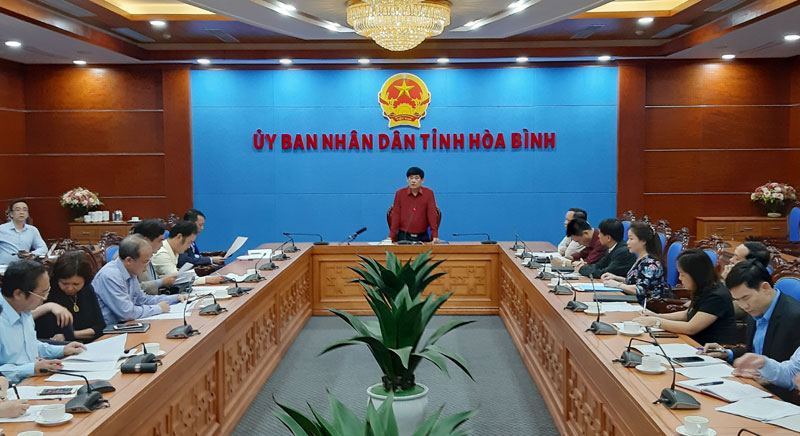
(HBO) – Vice Chairman of the provincial People’s Committee Nguyen Van Dung chaired a recent conference to evaluate an investment project on assisting 36 poorest villages in the province.
Photo:
Vice Chairman of the provincial People’s Committee Nguyen Van Dung concludes
the conference
In 2013, the
province ranked 36 villages as the poorest with high rate of poverty, poor infrastructure,
and low income of local residents. On January 20, 2014, the provincial People’s
Committee issued Decision No.73/QD-UBND, approving a project on supporting
those localities with total investment of 133.9 billion VND. The project is
designed to improve local infrastructure, develop production to raise locals’
income, and preserve traditional cultural values.
After five years implementing the projects, the rate of poor and
near-poor households in those villages fell by an average 5 percent per year,
from 41 percent in 2014 to 31 percent in 2018. Roads and electricity facilities
have been built in most of the villages.
All capital allocated to production development has been disbursed.
Thanks to the project, Mai Hoang Son village in Mai Chau
district’s Mai Hich commune, and Dau Khu village in Hoa Binh city’s Thong Nhat
commune have escaped from poverty and been excluded from the list of poorest
villages in the province.
However, due to capital shortage, several targets of the project have not been
realised, with more than 60 percent of planned infrastructure items not
receiving investment yet. Some villages have not received investment for
building automobile-accessible roads and clean water facilities. There is a
lack of standard schools, cultural houses and irrigational systems, while the existing
facilities are degrading. In addition, although many production models have
shown efficiency, they have failed to produce pervasive effects. Particularly,
many villages have been hard hit by landslide and flooding in the past two
years, including So hamlet in Trung Thanh commune and Nhap village in Da Bac
district’s Dong Ruong commune, with most essential infrastructure and
production models destroyed./.
The Standing Board of the Hoa Binh provincial Party Committee has agreed in principle on a proposal by the Standing Board of the Party Committee of Hoa Binh city to gather feedback on the city’s 1:2000 zoning plan, which forms part of its broader urban development strategy.
Hoa Binh province has made notable progress in public administration reform and digital government development, with the satisfaction index among citizens and businesses reaching over 84%, according to recent government evaluations.
Thanks to great efforts by local authorities in recent times, the governance and public administration performance of Mai Chau district has been significantly improved.
In the afternoon of June 6, the Party Committee, the People's Council, the People's Committee and the Fatherland Front of Lac Son district solemnly held a meeting to celebrate the 139th anniversary of the district's founding (1886–2025) and the 79th anniversary of the establishment of the district's Party Committee (1946–2025). There was the attendance of Mr. Bui Van Thang, the Vice Chairman of the Provincial People's Council; Mr. Quach Tat Liem, the Vice Chairman of the Provincial People's Committee; Ms. Dang Bich Ngoc, the Deputy Head of the National Assembly Delegation of the province; as well as the former leaders of the province and district through various periods, who are the natives of the district.
Implementing the Politburo’s Resolution No. 57-NQ/TW on breakthroughs in science – technology, innovation, and digital transformation is a golden opportunity for the northern mountainous province of Hoa Binh to renew growth model, improve competitive edge and shorten digital gap.
Resolution 57-NQ/TW, issued by the Politburo on December 22, 2024, identifies sci-tech, innovation, and digital transformation as strategic breakthroughs to build a developed and prosperous nation. In Hoa Binh province, this spirit is not just a slogan, it’s being put into action through concrete initiatives that form a "new development triangle”: digital citizenship, digital economy, and digital administration.



